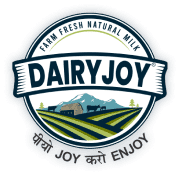When it comes to your child’s nutrition, the decisions you make early on can have a lasting impact. One of the most crucial choices is the type of milk your child consumes after breastfeeding. While the market is flooded with formula options and commercial milk brands, nothing quite compares to the goodness of farm-fresh milk.
Especially when it comes from healthy, ethically raised desi cows, like the A2 cow milk from Dairy Joy.

What is Farm Fresh Milk?
Farm fresh milk is milk that is sourced directly from healthy, grass-fed cows—without any industrial processing. It isn’t mixed, diluted, or adulterated. Most importantly, it’s free from hormones, antibiotics, and preservatives. At Dairy Joy, we use milk from indigenous breeds like Sahiwal and Gir, known for producing nutrient-rich A2 milk.
Why A2 Cow Milk is Special
Unlike A1 milk from foreign or hybrid breeds, A2 milk contains only A2 beta-casein protein, which is easier for humans to digest. Studies suggest A2 milk is less likely to cause discomfort like bloating, gas, or lactose intolerance symptoms.
Why is it Ideal for Children?
1. High Nutrient Density
Fresh cow milk is a rich source of calcium, essential for bone development in growing children. It also contains vital nutrients like vitamin B12, phosphorus, protein, and omega-3 fatty acids. A2 milk, in particular, has higher beta-casein protein, which supports neurological growth and digestion.
2. Free from Chemicals & Additives
Most commercial milk undergoes multiple stages of processing—pasteurization, homogenization, and sometimes adulteration with preservatives or powdered milk. Farm fresh milk from trusted sources like Dairy Joy is free from such treatments, making it a safer choice for infants and toddlers.
3. Supports Gut Health
Children’s digestive systems are delicate. A2 milk is known to be gentler on the gut and less likely to cause bloating, constipation, or intolerance symptoms. It naturally contains enzymes that aid digestion, helping children absorb nutrients more effectively.
4. Strengthens Immunity
Fresh milk retains more of its natural immunoglobulins and beneficial bacteria, which help in building a strong immune system. In a world full of pollutants and allergens, this becomes especially vital for young children.
The Role of Ethical Dairy Practices
How the milk is sourced is just as important as what’s in it. At Dairy Joy, our cows are grass-fed, stress-free, and lovingly cared for. This isn’t just good for the animals—it translates directly to the quality of milk they produce. We avoid hormone injections and ensure a hygienic, cruelty-free environment.
Easy Integration into Your Child’s Diet
Farm fresh milk can be given to toddlers over one year of age in various ways:
– As a warm bedtime drink.
– Added to porridges and cereals.
– Used in homemade milkshakes and smoothies.
– Mixed with mashed fruits for added flavor and nutrition.
Versatility in Your Kitchen
From sautéing vegetables to making baby food, Bilona desi cow ghee adapts beautifully. It has a high smoke point, making it ideal for Indian and international cooking. It’s also a great alternative to butter and cooking oils for those following paleo, keto, or Ayurvedic diets.
Real Stories, Real Results
We’ve heard from countless parents who switched to Dairy Joy’s farm-fresh A2 milk and noticed a visible difference. From improved digestion to better sleep patterns and stronger bones, the benefits are both subtle and significant.
Conclusion
Your child deserves the best start in life—and what could be better than milk that’s as close to nature as it gets? With farm-fresh milk, especially A2 cow milk from Dairy Joy, you’re choosing purity, nutrition, and ethical sourcing.
It’s not just a drink; it’s a foundation for lifelong health. Let your child grow with the richness of tradition and the assurance of quality. Because the best first food should also be the most trusted one.
Beyond nutrition, introducing your child to farm fresh milk is a gentle way to teach them about the origins of food and the importance of eating clean and local.
It helps establish a foundation for healthy habits early on—knowing what’s in their glass, understanding the value of animal care, and appreciating real, unprocessed food from a young age.


